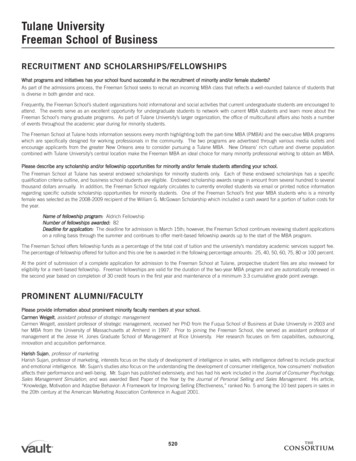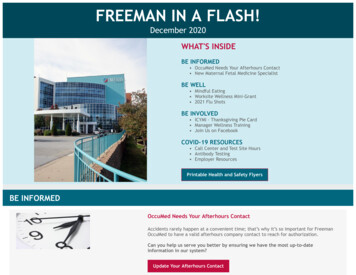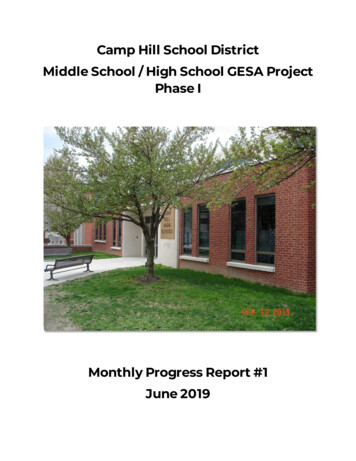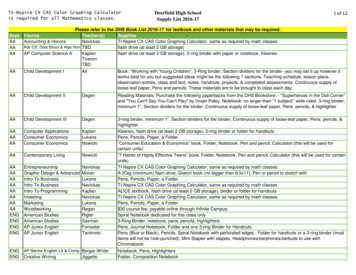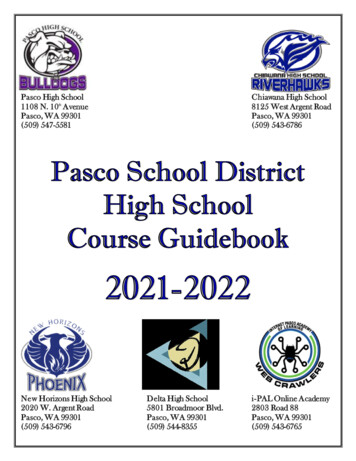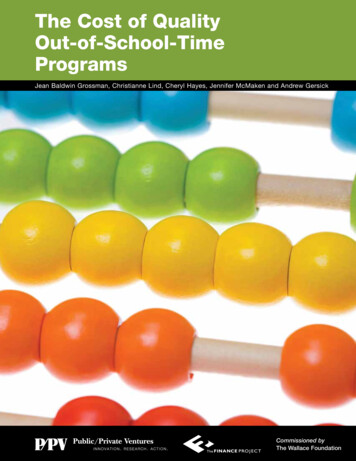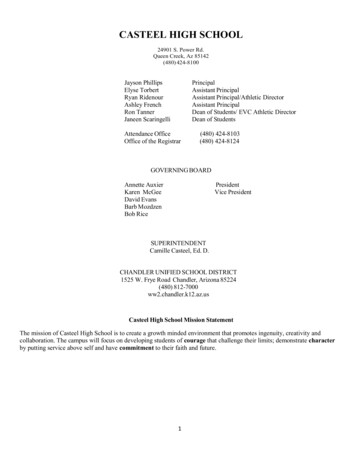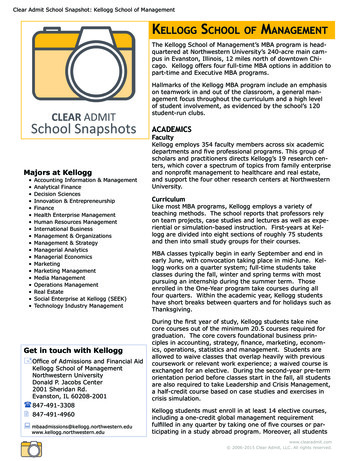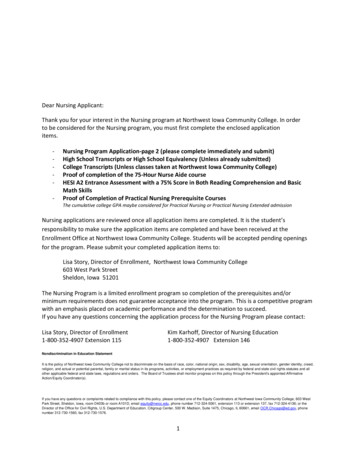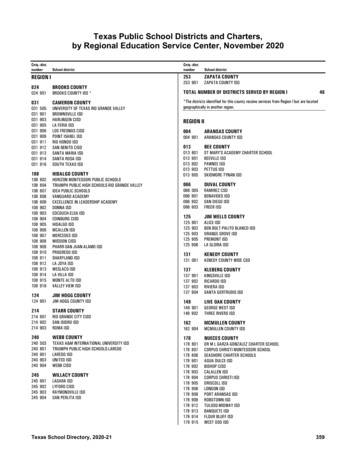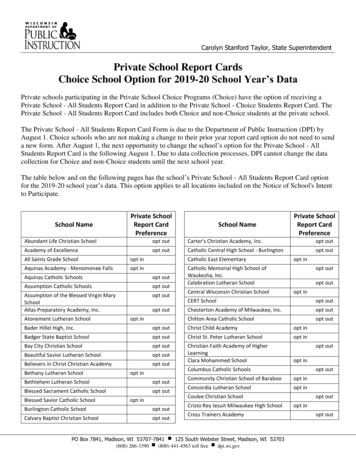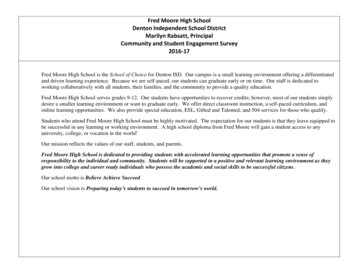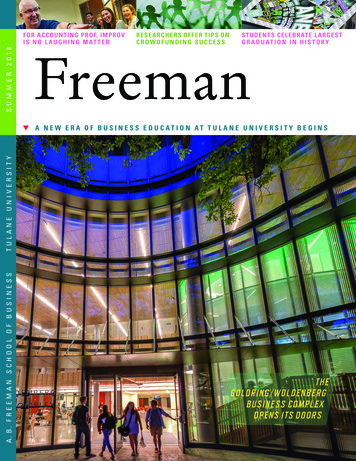
Transcription
R ESE A R C H E R S O FFE R T I P S O NCROWDFUNDING SUCCESSSTUDENTS CELEBRATE LARGESTG R A D U AT I O N I N H I S T O R YS U M M E R 2 018FOR ACCOUNTING PROF, IMPROVI S N O L A U G H I N G M AT T E RA. B. F R E E M A N S C H O O L O F B U S I N E S STULANE UNIVERSITYt A N E W E R A O F B U S I N E S S E D U C AT I O N AT T U L A N E U N I V E R S I T Y B E G I N STHEGOLDRING/WOLDENBERGBUSINESS COMPLEXOPENS ITS DOORS
S u m m e r 2 0 18Vo l. XXXV N o. 1tT H E M A G A Z I N E O F T H E A . B. F R E E M A N S C H O O L O F B U S I N E S STULANE UNIVERSITY18GREEN WAVEWith its façade of undulating glassand towering central atrium, theGoldring/Woldenberg Business Complexis a spectacular architectural achievement,but the building’s greatest accomplishment may be in how it fosters innovationin teaching and learning.23142833FROM THE DEANIN THE NEWSRESEARCHHONOR ROLL OF DONORSWITH ALUMNIAbove: Film producer Scott Niemeyer(BSM ’87) is betting big on HollywoodSouth. Right: A bigger, better CareerManagement Center.On the cover: The Goldring/Woldenberg Business Complex, new homeof the A. B. Freeman School of Business. Photo by Jackson Hill.
IN THE NEWSFROM THE DEANWITH ALUMNIFreemanFreeman is a biannual magazinepublished by the A. B. Freeman Schoolof Business at Tulane UniversityDEANIra SolomonS EN IO R A S S O CIATE D EAN F OR FACULTYPaul A. SpindtA SSOCIATE DEANSA C CR ED ITATIO N & STR AT EGIC PL ANNINGClifton BrownG R A D UATE PROGRAM SJohn ClarkeIN TER N ATIONAL PROGRAM SJohn TrapaniEDITORMark MiesterART DIRECTORTana ComanCONTRIBUTORSMary Cross, Alina Hernandez,Brandon Struthers (BSM’ 20)PHOTOGRAPHERSPaula Burch-Celentano, Cheryl Gerber,Jackson Hill, Sabree HillFreeman Magazine, Office of Communications,A. B. Freeman School of Business,7 McAlister Place, Suite 415C,Tulane University, New Orleans,LA 70118-5669 Telephone: 504-314-2471Email: lane is an affirmative action,equal opportunity employer.2FREEMAN S P R I N G 2 0 0 8ANEW ERA OF BUSINESS EDUCATION AT TULANE UNIVERSITY HAS BEGUN.In January, the new home of the A. B. Freeman School of Business — theGoldring/Woldenberg Business Complex — opened its doors to students. Designedby the internationally renowned architecture firm Pelli Clarke Pelli, this spectacular newbuilding features more than 80,000 square feet of new and renovated space, including10 brand new classrooms, 20 new faculty offices, more than 30 new breakout spaces, anew Financial Analysis Lab, a new venture incubator and entrepreneur-in-residence officeswithin the Albert Lepage Center for Entrepreneurship and Innovation, and dramaticallylarger spaces for our Career Management Center and Office of Undergraduate Education.Connecting everything together is the Marshall Family Commons, a breathtaking threestory atrium that has become the new hub of student life.While our growing enrollment was a significant driver of the decision to expand ourphysical plant, it wasn’t the only consideration. As the cover story of this issue explains,the Goldring/Wolderberg Business Complex was designed not simply to accommodatemore students but to build a stronger, more engaged community. From state-of-the-artclassrooms that enable instructors to teach in new and innovative ways to commonspaces that spark interaction and collaboration to special features like its very own PJ’sCoffee Shop, the Goldring/Woldenberg Business Complex brings people together innew and exciting ways.Perhaps the most gratifying aspect of this magnificent building is that it was madepossible entirely through the generosity of the Freeman community, the alumni, parentsand friends who stepped up to the plate and pledged their support to make it a reality.On behalf of everyone here at the Freeman School, I offer you our sincere thanks. I wouldlike to especially thank Bill Goldring and Pierce Marshall Jr., who through their familyfoundations provided us with building anchor gifts. I’ve known Bill and Pierce for nearlya decade, and in that time I’ve benefitted tremendously from their counsel, leadershipand dedication to Tulane University and the Freeman School. Without their extraordinarysupport, the Goldring/Woldenberg Business Complex would not have been possible.While the opening of the building has occupied much of our attention over the lastyear, it’s just one of many exciting things we’ve been working on. This summer alone,we’ve launched a new program — the Master of Business Analytics — hosted nearly200 students from China, Guatemala, Panama and Peru enrolled in international master’sprograms through our Goldring Institute, and welcomed nine new scholars and educatorsto our faculty, the latest additions in our ongoing faculty expansion effort.In closing, I’d like to thank you — our alumni, parents and friends — for yourcontinued support, and I’d also like to encourage each of you to visit us here in our newhome. The Goldring/Woldenberg Business Complex is your building. We’d love for youto experience it in person.
RESEARCHIN THE NEWSFROM THE DEANWITH ALUMNIDomain Cos. co-founderMatt Schwartz (BSM ’99),center, shared insights aboutreal estate development aspart of a new series of coursesdesigned to connect studentswith alumni in the field.New courses connect students with alumni expertsYou’ve heard of experiential learning, but what aboutexpeditionary learning? For the students who tookpart in this year’s intersession courses, some ofthe most exciting learning took place out of theclassroom and off campus.“Going into the city and meeting developers was definitelythe most rewarding part of the class for me,” said Patrick Madden(BSM ’18), who took the intersession course on commercial realestate. “There are so many things that you can learn only fromactually talking to somebody that’s been in the business.”Connecting students with alumni in the field was a guidingprinciple behind the intersession courses, a new series of intensiveseminars offered between the fall and spring semesters. Co-taughtby Freeman faculty and industry experts, many of whom werealumni, the weeklong courses provided students with a deep diveinto five industries: real estate, health care, private equity, energyand law. Each of the courses featured interaction with industryprofessionals, visits to industry-related sites and a hands-onproject that enabled students to apply their knowledge in areal-world setting.“We’ve always connected our teaching with industry practice,but the intersession courses took that to a new level,” said IraSolomon, dean of the Freeman School.Among the alumni who volunteered their time to co-teachcourses were Casey Herman (BSM ’86), U.S. Power & UtilitiesIndustry Leader with PricewaterhouseCoopers, Stacey Berger(A&S ’76, MBA ’78), executive vice president of Midland LoanServices/PNC Real Estate, and Dave Sislen (A&S ’76), presidentof Bristol Capital Corp. The classes also incorporated substantialinteractions with notable alumni including James Maurin(MBA ’72), former chairman of Stirling Properties, JeremyPHOTO COURTESY OF THE SHOP AT THE CACCrigler (BSM ’88), chief investment officer of Tulane University,and Matt Schwartz (BSM ’99), co-founder of the Domain Cos.“I think what the students liked was the strong connectionbetween academic and real-world application,” said MikeHogg, associate dean for undergraduate programs. “I thinkthey also liked that these were project-based courses, so theywere much more hands-on than the traditional full-semesteracademic classes.”The centerpiece of the real estate course, for example, was acase competition that used as its focus an actual project currentlybeing developed in New Orleans: an extended-stay hotel acrossfrom the new downtown medical center. The students visited thesite, met with the developer and reviewed the project’s pro formafinancials in order to evaluate its potential and make investmentrecommendations.“I think visiting the property and meeting the developer reallycontributed to the real-world feel of the project,” said real estatestudent Matt Newman (BSM ’18). “Unlike some cases, this wasreally happening, and there wasn’t a right or wrong answer.”While January’s intersession courses served as a pilot programof sorts, Solomon says Freeman is planning to replicate the modelwith additional courses in the future.“Alumni are one of our most valuable educational resources,”Solomon said. “By engaging students with alumni professionals— ideally many alumni professionals — students develop a muchdeeper understanding of industry, and they’re also able to learnabout career paths and build their networks. It’s a most excitingformula, and one we’re looking forward to developing further.”Students who took the courses seem to agree.“It was just a really good class,” Madden said. “Probably oneof the best I’ve taken at Freeman.”S U M M E R 2 0 1 8 FREEMAN3
RESEARCHIN THE NEWSFROM THE DEANWITHL i ve ALUMNIf ro m Ne wCO r l e a n s , i t’s a cco u n t i n g c l a s s !omedy isn’t something you typically associatewith accounting, but Tim West isn’t your typicalaccounting professor.In addition to holding a PhD in accounting, West, a professor of practice at the Freeman School, is a graduate of theSecond City, the famed improvisational theater in Chicago thatlaunched the careers of John Belushi, Bill Murray, Tina Feyand Amy Poehler. A few years ago, West began incorporatingimprov exercises into his courses.A typical class might start with a game like String of Pearls,in which students call out random sentences that become thefirst and last lines of a story.“People think improv is justThe rest of the class then fillsin the story, one line at a time,comedy, but that’s actuallyin an attempt to connect thesecondary to how youfirst line to the conclusion. Thecommunicate. Improv teacheslaughs come from the story’sstaying in the moment.” improbable twists and turns,but West says there’s a mes—Tim West, professor ofsage to the madness.practice in accounting“People think improv isjust comedy, but that’s actuallysecondary to how you communicate,” he explains. “Improvteaches staying in the moment.”Staying in the moment is just one of lessons students canlearn through improv. West says it also teaches students toact as an ensemble, to focus on others, to reserve judgement,to fail without fear, and to simplify the conversation —communication skills increasingly valuable in today’sbusiness environment.“Don’t ever call these soft skills,” West says. “I call themimpact skills because they’re the skills you need to make animmediate impact.”Executive MBA student Matt Burton, managing directorof an automation engineering firm in Mobile, Alabama, soenjoyed the improv games he learned in West’s class, hebegan incorporating them into the interactive planning sessionshe leads for clients.“I actually used several improvs directly from his classto loosen people up and get them talking,” says Burton.“Everybody is always flabbergasted with where I come up withthis stuff, so I had to give Tim credit — ‘Yeah, I got this out ofmy MBA program.’”The credit is nice, but West says he gets more satisfactionfrom knowing his students have the tools they need to standout in a crowded job market.“Listening effectively, moving the conversation forward,being comfortable with not being the star — employers aregoing to hire those skills in a heartbeat,” West says. “As amanager, I’d rather have that package of skills than your abilityto reconcile cash. Eventually, artificial intelligence is going to beable to reconcile cash. It won’t be able to do those other things.”Professor of PracticeTim West, a graduateof the Second Cityin Chicago, uses hisimprov training to teachstudents real-worldcommunication skills.PAULA BURCH-CELENTANO
FORM ER FED V I CE CHA I RDELI V ER S R. W. F R E E M A N L E CT U R EThe 2016 presidential election exposed deep fissureswithin U.S. society, but in an appearance at theFreeman School, economist Roger W. FergusonJr. said today’s economic and cultural divide hashistorical precedents.“This is not at all dissimilar to the U.S. transition from anagricultural economy to an industrial economy,” said Ferguson,former vice chair of the Federal Reserve and current presidentand CEO of TIAA, one of the nation’s leading retirement servicesproviders. “There’s great uncertainty about jobs and greatuncertainty about the skills that one needs.”Ferguson attributed the current unease to the shift from anindustrial to a post-industrial or technology economy. It took theU.S. a generation to move from an agricultural to an industrialeconomy, Ferguson said, and he expects the current transition totake about as long.“At the end of the day, I’m highly optimistic about our abilityto move because we’ve done it in the past,” Ferguson added.“But that’s not to say it’s going to be quick or easy or can be donewithout some rough patches.”The changing economy was just one of the topics Fergusonaddressed as the 2017 R.W. Freeman Distinguished Lecturer. In awide-ranging Q&A session with students in November, Fergusondiscussed subjects including Fed policy, U.S. competitiveness, thebenefits of globalization and the student-debt crisis.“Those that get in the most trouble with [student debt] arenot those with the largest amounts,” Ferguson noted. “Ironically,the ones who default are the ones who have the smallest debtPAULA BURCH-CELENTANORoger W. Ferguson Jr., former vice chair of theFederal Reserve and current president and CEOof TIAA, discussed the changing economy asthe 2017 R.W. Freeman Distinguished Lecturer.burden but who went to trade schools or other schools that didn’tgive them entree into a really high-paying job.”While graduates of traditional universities and professionalschools may amass significant debt, Ferguson said those graduates typically emerge with the skills they need to land good jobsand service their debt.“Let’s focus on where the challenge is,” Ferguson said. “Ithink it’s a question of educating people and creating a highdegree of awareness that when you go to one of those tradeschools or for-profit schools, that may not set you up as wellas you were hoping.”“We were truly fortunate to have Roger serve as the 2017R.W. Freeman Distinguished Lecturer,” said Freeman SchoolDean Ira Solomon, who served as moderator. “The breadth anddepth of his experiences and knowledge are truly amazing, andhis ability to cogently communicate what he has learned alongthe way is even more amazing.”The R.W. Freeman Distinguished Lecture series is named inhonor of Richard W. Freeman Sr. (BBA ’34), former president andchairman of the Louisiana Coca-Cola Bottling Co. and chairmanof the board of Delta Air Lines. Freeman served on the Board ofTulane for 13 years and led the effort to name Tulane’s businessschool in honor of his father, A. B. Freeman. In attendance atthis year’s lecture were several members of the Freeman family,including Richard Jr. (BBA ’60) and Sarah Freeman, Louis Sr.(’63) and Judith (’63) Freeman, Tina Freeman, Louis Jr.(BSM ’86) and Courtney (NC ’87) Freeman, and West (UC ’03)and Aimee (MBA ’95) Freeman.S U M M E R 2 0 1 8 FREEMAN5
MB A s C R EAT EA PP TO MA N AG ERENTA L DE P OS I TDIS P UT ESLydia Winkler (MBA/JD ’19) and Marco Nelson (MBA ’19) are the creators of RentCheck, a rental inspection app thatallows both tenants and landlords to track a property’s condition using time-stamped photos.Two Freeman School MBA students have turned their gripes with renting into a company thatcould revolutionize how lease agreements are managed.Lydia Winkler (MBA/JD ’19) and Marco Nelson (MBA ’19) are the creators of RentCheck,a rental inspection app that lets both tenants and landlords track a property’s condition usingtime-stamped photos.Winkler was motivated to create the app after having to sue her previous landlord who refused to returna 1,600 deposit after her first year of law school. Nelson owns property out of stateand felt routinely frustrated by the lack of transparency with the condition of his rentals“We’re building a productbetween move-in and move-out of tenants.that alleviates the friction“It took me a year to recover that 1,600 deposit,” Winkler said. “I could not havebetween landlords and renterssuccessfully represented myself in court if I had not gone to law school, plus, noteveryone can wait a year to get their money back.”around security deposits.”RentCheck works like this: A tenant downloads the app and makes an unalterable—Marco Nelson (MBA ’19),and time-stamped record of a property’s condition before moving in. The app promptsco-founder of RentCheckthe user to take photos and add notes and generally guides them through checkingappliances, electrical outlets and the condition of each room. The photos and notes arethen uploaded and cannot be altered.“My law school education helped me understand the importance of integrating time-stamped photosinto RentCheck and how we can help both landlords and tenants as a third party holding imperative propertyinformation,” Winkler said.If a landlord downloads RentCheck they can set up a property and request the renter to perform themove-in inspection. After the inspection is complete, the landlord can review all images and notes storedin the app.“This way, there is a record of the inspection and no one can dispute what was there on move-in day,”Winkler said.More than 30 percent of all renters lose all or some of their deposit at the end of a lease, Nelson said.And while the concept of leasing a property isn’t new, most rental agreements are done just as they were40 years ago — with a written contract, a paper move-in checklist and a couple of signatures.“RentCheck brings transparency and accountability to not only landlords like myself, but also renters.We’re building a product that alleviates the friction between landlords and renters around security deposits,”Nelson said.The duo launched RentCheck in March and it’s already creating buzz in the market, they said. Users areoffering suggestions and Nelson is issuing updates to improve the app.“We’re basically standardizing the move-in and move-out process,” Winkler said. “Based on thefeedback we’re getting from our users, there’s room to disrupt the industry.”The RentCheck app is currently available in the Apple App Store, and an Android version is in the works.6FREEMAN S U M M E R 2 0 1 8ALINA HERNANDEZ
RESEARCHIN THE NEWSFROM THE DEANTu l a n e h o n o r s C o m e r a n d Ro s e n t h a la s 2 0 1 8 E n t re p re n e u r s o f t h e Ye a rThe A. B. Freeman School of Business at TulaneUniversity honored business executive PatrickComer as Tulane Distinguished Entrepreneur of theYear and civic activist Sandy Rosenthal (MBA ’81)as Tulane Outstanding Social Entrepreneur of theYear at the 2018 Albert Lepage Center for Entrepreneurship andInnovation Awards Gala. The ceremony took place on April 19at the Audubon Tea Room in New Orleans.The Freeman School’s Lepage Center for Entrepreneurshipand Innovation presents the awards each year to highlightoutstanding entrepreneurs in the community. The TulaneDistinguished Entrepreneur of Year Award honors individualswho combine a history of entrepreneurial success with philanthropic generosity and service to the community. The TulaneOutstanding Social Entrepreneur of the Year Award recognizesindividuals who are solving social problems and meeting community needs through the use of entrepreneurial principles.Comer is the founder and CEO of Lucid, a company whoseplatform connects buyers, sellers and users of survey sample data.The company is headquartered in New Orleans with offices inLondon, New York and New Delhi, India. Comer has worked instartups since 1998 and in market research since 2003. He beganhis career as chief of staff at govWorks, the Silicon Alley venturefeatured in the 2001 documentary Start-up.com. In 2005, hejoined OTX Research, where he worked to improve the company’ssample acquisition and matching technology. Comer also workedat IFIL
(MBA ’72), former chairman of Stirling Properties, Jeremy Crigler (BSM ’88), chief investment officer of Tulane University, and Matt Schwartz (BSM ’99), co-founder of the Domain Cos. “I think what the students liked was the strong connection
